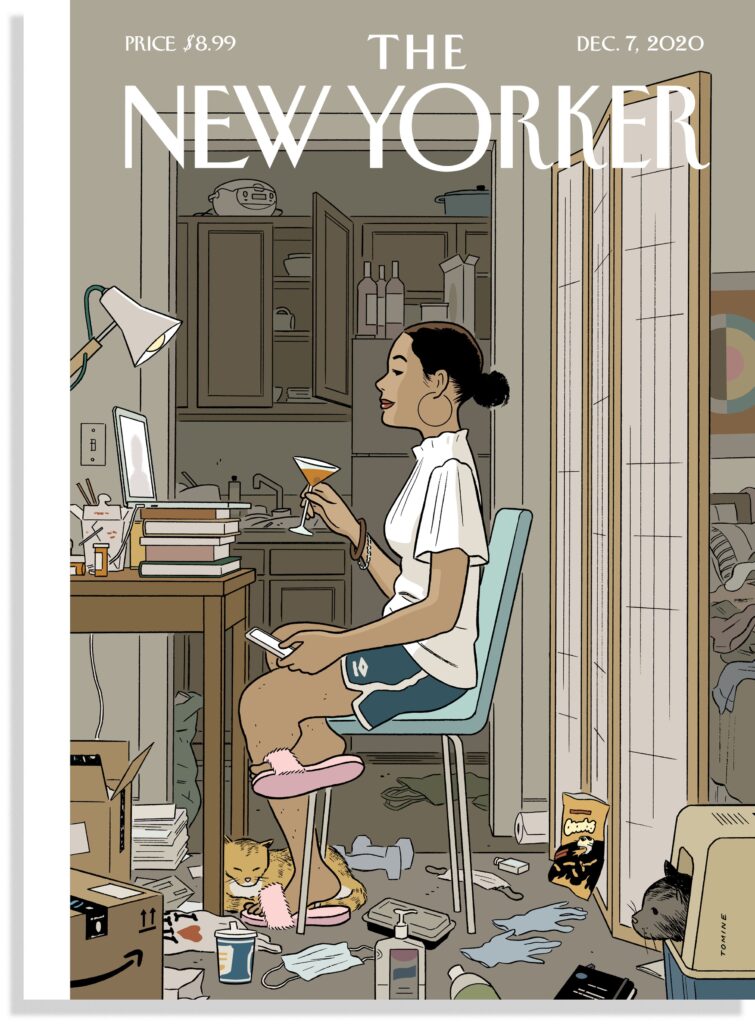Love Life: Thoughts on the New Yorker Cover

The front cover of the New Yorker always has its finger on the pulse. Someone posted this the other day and it really caught my eye. 2020, the year where it looks like you’ve got your shit together but clearly you’ve not. It really got me thinking.
This year has seen sustained and continual crisis that has affected the global economy and people’s lives in ways we couldn’t have imagined this time last year. The need to pivot and adapt has been continual for many organisations and the continuing uncertainty becomes draining. Watching our small local pub continually change and adapt to the new regulations and government advice in order to keep providing a service and survive has been humbling.
The New Yorker cover reveals the stress that many young workers are facing. Working from home alone or pressures of living in shared accommodation with lack of space is just the beginning. The loss of human connection and face to face communication magnifies the loneliness that many people feel. Studies are showing that home working may bring many challenges and distractions.
There have been some helpful posts and articles on LinkedIn that have helped business navigate the pandemic.
As we move into a Scottish winter of dark days and long evenings, personal energy levels and those throughout your organisation may be at risk of exhaustion. At worst it can take a toll on people’s mental and physical health, causing major harm to organisational effectiveness, from a decline in responsiveness to a deterioration in the overall quality of work.
Remote working means many managers feel they do not have good visibility into employees’ performance. Employees may feel more anxious, often amid circumstances (e.g., caring duties) that might mean they can’t perform as usual. If you are a person who isn’t struggling but has the resources to help others, reach out and take the brave step to offer help to someone who you might see struggling. Asking how someone is can never make it worse…
Leadership and employee engagement play a key role in successfully navigating the new normal. Which got me thinking that these are the same behaviors that establish a quality culture in organisations. Those organisations whom place quality at the center of their business should have the processes in place to ensure that vision and values are communicated effectively and nourished by all. These processes enable organisations to be resilient through sustained crisis.
Many organisations have introduced new ways of working such as daily check-ins/-outs and regular retrospectives. This has provided an opportunity to install a more permanent feedback culture and enable leaders to continue to not only communicate but to evolve the vision and values throughout these challenging times. Using this feedback culture can develop a stronger team with shared goals that should be consistent with our shared values. Our shared values are particularly important in times of uncertainty—they can unite and strengthen us and provide something that we can be certain about.
As we move forwards through the pandemic, we need to continue to use the evolving feedback cultures to support each other and work through the developing new normal. This feedback culture could be harnessed to increase employee engagement which is related to developing positive work-based cultures of quality. Fundamentally, quality is about meeting or exceeding customer expectations year after year. That’s where the value is, measured in higher revenues from greater customer satisfaction and in higher operational efficiency and effectiveness due to increases in productivity and innovation—and of course even employee engagement….Let’s hope 2021 is a better year and if people have experienced some positives from the new ways of working, that this can be sustained.
